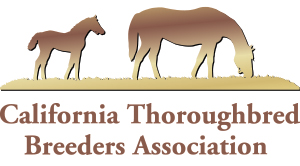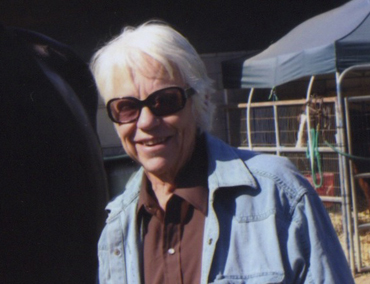By Wendy Averill
Phyllis Lambert, who passed away from chronic obstructive pulmonary disease on Mar. 27, 2014, was a fixture at California Thoroughbred sales since the late 1960s. But more than being a “fixture,” she changed the way Thoroughbred sales, and hence the industry, employed women.
In 1973, she and (CTBA Director) Leigh Ann Howard were hired by Rollin Baugh, of California Thoroughbred Consultants, to create at Hollywood Park anything necessary to conduct probably the most prestigious and most unprecedented Thoroughbred sale ever conducted in California up to that time. Fletcher Jones, of Westerly Stud Farm, had been killed in an airplane crash and all of his 140 horses were to be dispersed.
As Auction Sales Manger, Phyllis and her colleague, Leigh, were responsible for everything horse related for the Westerly Dispersal. The sale barns they were to use at Hollywood Park were a mud bog so truckloads of rock dust had to be dropped and leveled. Stall screens had to be borrowed, sand blasted, painted in Rollins’ colors and, upon the closure of the sale, the exact same screens had to be re-sandblasted, painted in the original farm’s colors and returned to the farm of origin. As some of the most prominent Thoroughbred owners in the world were to be present for this sale, the barn area had to look spectacular. Flowers, tanbark, canopies, railroad ties, valance, signature sales, uniforms, you name it. For a California horse sale, such an embellishment had not been done before. And when the buyers came to see the Westerly horses, it was an all-female crew that did the showing of the horses. For such a prominent sale to have an all-female show crew was unheard of in 1973. Typecast, the star of the performance, was sold for a world record for a race horse at auction for $725,000, and ultimately went to Japan.
Thus, started Phyllis’ long career in auction sales. Shortly before her death she said, “I love horse sales. I have dreams about them almost every night.” In one sale, she had 205 horses in a major dispersal. This required about 50 employees hired ahead of time but only 20 showed up. “I was crazy that sale. You like to think that as the person in charge, you know everything that is happening with everyone. But it was pretty hard to do at that sale, as some of the yearlings had very limited handling, were not broken to lead and had never been in a stall.”
In addition to the Westerly dispersal, she handled the dispersals of George Pope, J.J. Elmore, Alan Clore, The Anvil, Donald Baldwin and others. One of the horses she was most proud of was Rainbow Quest, who later won the Arc de Triomphe and became a successful sire. She managed sales for Rollin at Fasig-Tipton Kentucky and Saratoga, as well as in California.
Ultimately, she left the auction sales field and bought her own farm, Notjustanother Horse Farm, in Chino, where she specialized in layups and sales prep. No one was more skilled than Phyllis at getting a horse beautifully prepared for a sale. Additionally, she bred and raised a few horses of her own. She rescued unwanted horses and cared for them until their human death. Two of the last three horses Phyllis owned were rescue horses. With Phyllis, horses and their well-being come first. Always.
Phyllis’ love of horses started at age 3 when her grandmother put her on a pony for the first time. She was gainfully employed by the age of 11 when she cleared stalls and saddled horses six days a week in exchange for two riding lessons. At 13 she went to the Glory Ranch, home of the palomino Rose Parade leader, Top Hat. Later she worked with Roy Register training Saddlebreds and fine harness horses. For several years she worked at Rancho Jonata for Dr. James Buell where she did almost everything having to do with the horses. Horses were her life from age 11 and until her death at 67.
One of Phyllis’ most outstanding qualities was her ability to assess a horse quickly and accurately. Had she been a track veterinarian, she would have been one of the best. But it was her love of animals that endeared her to people who were truly attached to their equines. She would go down a shed row, look at a horse and say, “I know that horse. I sold her two years ago in the January Sale. Come here, Sweet Thing,” and over the horse would come. It seems like she knew and remembered every horse she had ever sold. But she also worked with the difficult horses. If a challenging horse came into a sale, Phyllis was the one who took that horse in hand. She did not ask her employees to do anything she had not done or would not do herself.
As evidence of her skill with horses and her ability to work with her staff, she had many former employees who went onto other horse connected careers. They wrote books about horse care and training, won the Kentucky Derby, trained show horses for major events, become a Thoroughbred agent, managed the stable for a major Thoroughbred auction company, trained a Horse of the Year, became a well-known endurance rider, rode in the Rose Parade and won a major Three Day Event off a horse that cost $300.
Phyllis is survived by a legion of human and non-human friends and admirers, as well as her two Jack Russells, Landy (Landaluce) and Rags (Rags to Riches), who are looking for a new home.
Her favorite horse that she bred herself is 7-year-old Portfolio, who, in the past year, has started 17 times and been in the money 16 of those. Interestingly, almost to the minute of Phyllis’ death, Portfolio was beaten a next for first money. Portfolio, like her breeder Phyllis, never ran a bad race.


